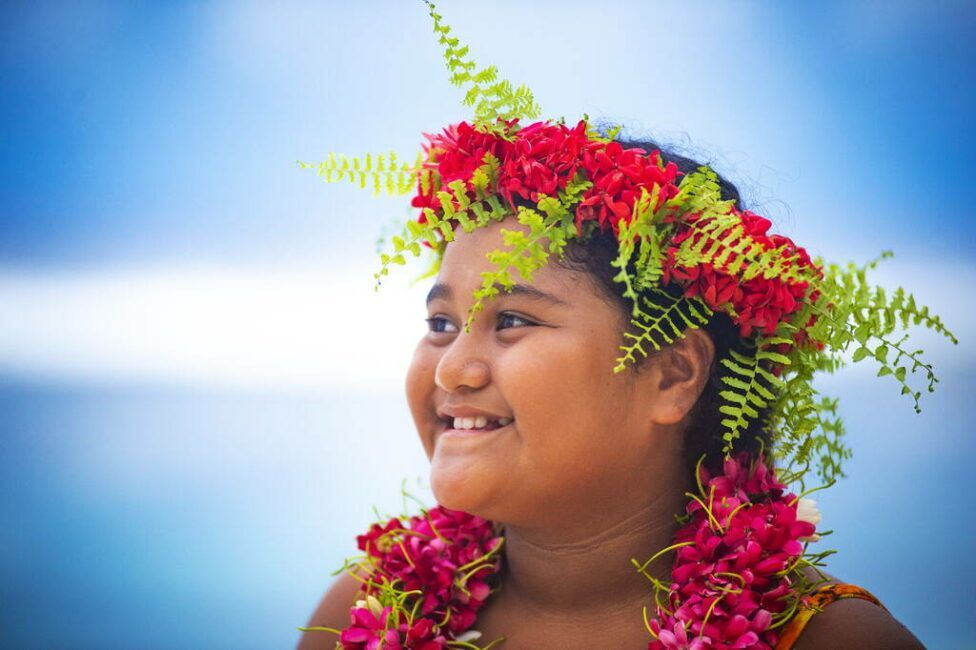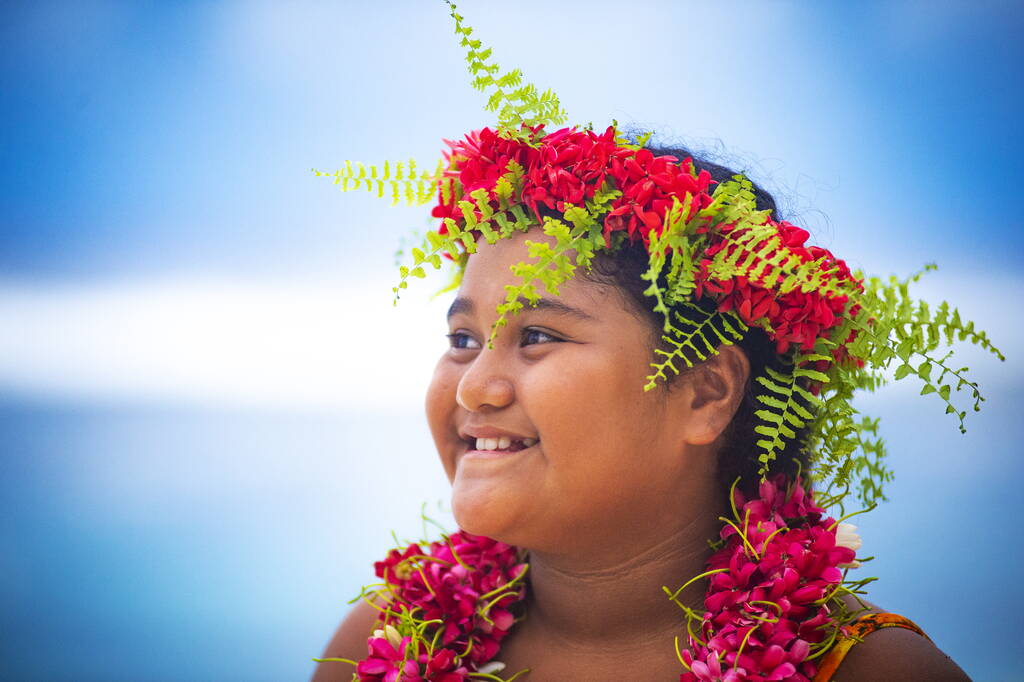Cook Islands Maori Words and Phrases to Learn for Your Next Trip
Travelling is all about exploring different cultures. One of the basic ways to get started on becoming immersed in new surroundings is to start speaking the local language. Of which, this list of Rarotongan words (better known as Cook Islands Maori words) to learn for visiting the Cook Islands is a great place to start.
Don’t get us wrong, you don’t need to be fluent in Cook Islands Maori to get by in Rarotonga and the Cook Islands. Everyone speaks English. Nevertheless, it is helpful for yourself and when speaking to locals to know how to say some basic words and pronounce Cook Island Maori words correctly.
Check out What is the Rarotonga & Cook Islands Language? for a crash course on pronunciation. In the meantime, here are some easy Rarotongan words and phrases to learn for your next trip to the Cook Islands.
Is There Such a Thing as Rarotongan?
The Cook Islands is home to 15 different islands, some of which have their own dialects of Cook Islands Maori. “Rarotongan” is the dialect of the main island, Rarotonga, and the version of Cook Islands Maori that you are likely to hear the most on your visit to the Cooks. With that in mind, this list of Cook Islands Maori words gives examples in the dialect of Rarotongan.
1. Kia Orana! – Hello!
Greeting you even as you enter the airport terminal in Rarotonga, Kia Orana is often travellers first encounter with the native language in the Cook Islands. Kia Orana is used to say “hello” in the Cook Islands but it actually means “May you live a long and fulfilling life”.
How Do You Reply to Kia Orana?
People usually reply to Kia Orana just the same, “Kia Orana!”
2. Popongi Manea – Good Morning
Another greeting you can use is Popongi or Popongi Manea, which means “Good morning”. It’s not too difficult to remember and your resort staff will appreciate it. Remember that the “ng” is a soft sound – don’t pronounce the “g” too hard. Find out more about pronouncing letters in Cook Islands Maori in What is the Rarotonga & Cook Islands Language?
3. Meitaki – Thank You
Cook Islanders are very accommodating so there are probably going to be a few occasions when you’ll want to show your gratitude by saying thank you (that’s if your momma taught you right)! Meitaki means “thank you” or take it a step further by saying meitaki ma’ata, which means “thank you very much”.
4. ‘Ine – Please
On the subject of politeness, if you want to say “please” at the end of your question, say ‘ine.
5. Ae – Yes, Kare – No
These two simple notions are important to be able to express no matter where you are in the world, so when you’re in the Cook Islands, note that ae means “yes” and kare means “no”.
6. Ka Kite – See You Later
A common and relaxed way to say goodbye in the Cook Islands is Ka kite, which means “See you later”. New Zealanders will likely be familiar with the similar phrase in New Zealand Maori.
7. ‘Arere Ra – Farewell
The more formal way of saying goodbye, which is still commonly used, is ‘Arere Ra! This is the phrase used to say goodbye to the person that is leaving. The person who is staying would say E no’o ra!
8. Kai – Food
Everyone’s got to eat, right? So this one is an important one! Kai means “food” in Rarotongan, which New Zealanders will also be familiar with. A similar word you will hear is umukai, which means “feast” and usually refers to food slow-cooked in an underground oven. Check out where to find the best kai in the islands by using The Food Guide to the Cook Islands.
9. Kia Manuia! – Good Luck!
This is one that Cook Islanders use a lot. Kia Manuia means “Good luck” and is often said to travellers heading out for some of the Cook Islands more adventurous activities – not that you’ll need any luck, the Cook Islands tours and experiences are all safe as long as you’re sensible. Check out some of those experiences in the 101 Best Things to Do in the Cook Islands.
10. Ta’i, Rua, Toru… – One, Two, Three…
… ‘A, Rima, Ono, ‘Itu, Varu, Iva, Ta’i-nga’uru! Now you know how to count from one to ten in Cook Islands Maori!
11. Reka – Nice
The word “nice” can be used in all sorts of situations, so if you want to use a common upbeat word in Rarotongan, say reka!
12. Motu – Island
Islands are kind of a big deal in the Cook Islands, so you will often hear Cook Islanders saying “motu” when pointing to this island or that island. When Cook Islanders are talking about motu on Rarotonga, they are usually referring to the four islands just off the coast of Muri: Taakoka, Koromiri, Oneroa and Motutapu.
13. Nu – Drinking Coconut
Drinking from a refreshing coconut is a staple of the Cook Islands, so if you want to ask for a young coconut that you can drink from, ask for a nu. For more drink recommendations, check out the 10 Drinks in the Cook Islands You Have to Try.
14. Ariki – High Chief
An integral part of Cook Islander culture, the ariki is the high chief. While traditionally the high chief was a ruler and the first-born son from royal line, today ariki are more of a figurehead who serve to advise the elected government in the Cook Islands’ modern democratic system. Get more into politics in Who Owns the Cook Islands? The Political Status of the Cook Islands.
15. Meri Kiritimiti – Merry Christmas
If you’re visiting the Cook Islands during the festive season, get your Christmas greetings at the ready by learning to say Meri Kiritimiti! Learn more about visiting Rarotonga and the Cooks at this time of year by checking out our guide, How to Spend Christmas in Rarotonga & the Cook Islands.
More About Rarotongan and Cook Island Maori Words
That’s it for our list of Rarotongan words to know when visiting the Cook Islands. Learn more about the language and culture of the Cook Islands in the following articles:
- What is the Rarotonga & Cook Islands Language?
- Cook Islander Etiquette: Rarotonga & Cook Islands Customs & Traditions
- Who are the People of the Cook Islands?
Finally, find more essential advice for visiting the Cooks in The Best Cook Islands Travel Guide and the 30 Tips for Travelling in Rarotonga & the Cook Islands.
Author
Robin C.
This article was reviewed and published by Robin, the co-founder of Cook Islands Pocket Guide. He has lived, worked and travelled across 16 different countries before settling in the South Pacific, so he knows a thing or two about planning the perfect trip in this corner of the world. Robin works and consults regularly with Cook Islands Tourism Corporation, a local government body representing the tourism industry. Robin is also the co-founder of several other South Pacific travel guides and is a regular host of webinars with the South Pacific Tourism Organisation.

